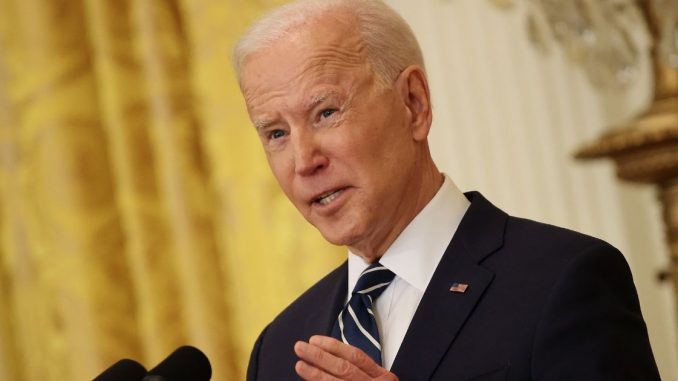
Just three weeks ago, President Joe Biden signed a $1.9 trillion COVID relief bill passed by congressional Democrats. Now, Biden is already imploring Congress to spend another $2 trillion on infrastructure.
Biden’s massive plan is designed to “modernize aging infrastructure and address climate change,” according to The Hill. In a Wednesday speech in Pittsburgh, Biden claimed that the plan would create middle-class jobs.
“We have to move now,” Biden said. “I am convinced that if we act now, in 50 years, people are going to look back and say, ‘this was the moment that America won the future.’”
.@POTUS: "We have to move now, because I'm convinced that if we act now in 50 years people are going to look back and say, this was the moment that America won the future." https://t.co/8bgtbqsQZE pic.twitter.com/lUdAa9SYBR
— The Hill (@thehill) April 1, 2021
On paper, Biden’s plan sounds all well and good, at least to the establishment media. The Hill explained all the positives that Biden claims will come from the massive spending.
“Biden’s $2.25 trillion proposal aims to repair 20,000 miles of roads and 10,000 bridges, expand broadband access to rural and underserved communities, replace all of the nation’s lead pipes and service lines to ensure clean water, invest in research and development and manufacturing, and expand access to home and community-based care,” the article stated.
Later, reporter Morgan Chalfant at least touched some of the criticisms the plan has already received. For example, Biden plans to use the Democrats’ favorite strategy of taxing the rich in order to fund his massive spending.
For Republicans, that means taxing job creators, and will only hurt the economy in the long run.
“To pay for part of this massive new spending package, President Biden proposes steep new taxes on businesses which will hurt working families and last more than a decade. This is the wrong approach, and will only undermine our economy at a time when we are beginning to recover,” Ohio Republican Sen. Rob Portman said in a statement Wednesday, The Hill reported.
“We can work together to find common-sense ways to pay for real infrastructure legislation without resorting to partisan tax hikes that will hurt our economy.”
In addition, according to The Hill, Biden referenced “Wall Street” estimates that the plan would create “over 18 million jobs over four years,” which The Hill piece admitted is a “vague” claim at best.
“The White House has said the plan would create millions of jobs but has not offered a specific estimate,” Chalfant wrote, adding that Biden could have been referencing a 2020 report by Moody’s Analytics that 18.6 million jobs would be created Biden’s full economic agenda was adopted.
Moody’s Analytics has a history of left-leaning bias. The company has been a long-time critic of former President Donald Trump, and predicted in 2016 that his policies would lead to a recession, Time magazine reported.
This prediction turned out to be largely false, as the American economy was thriving under Trump until the coronavirus pandemic struck.
In an October 2020 article, Bloomberg reported that Donald Trump’s economy was successful. The article noted that under Trump, overall unemployment dropped, employment for Americans aged 25 to 54 rose for the first time since the 1980s, and the median household income increased almost by almost $6,000.
As it turns out, tax cuts and sensible economic policies are typically more effective than reckless government spending to the tune of trillions of dollars.
House Minority Leader Mitch McConnell seemed to signal that he was not expecting to support the infrastructure plan on Wednesday after Biden briefed him on it, according to CBS News.
“Let’s see what this infrastructure package looks like,” he said. “If it’s a Trojan horse for a massive tax increase, put me down as highly skeptical.”
In addition to the 7 percent corporate tax increase, CBS News reported that the plan would seek to “renegotiate with other countries a global minimum tax on multinational corporations,” which simply means tax them more.
Given the Republican opposition, they said Democrats could attempt to once again invoke budget reconciliation to pass the bill and avoid a filibuster by Republicans.
However, Democrats already used reconciliation to pass the COVID relief bill, so it would take some unusual parliamentary maneuvering, and the cooperation of the Senate parliamentarian, for the party to proceed along those lines.
West Virginia Sen. Joe Manchin, a rare moderate on the left, as said that he did not want to take that route and would rather try to win over Republicans with a bipartisan effort.
“I’m not going to do it through reconciliation,” he told Axios on HBO last month regarding an infrastructure bill. “I am not going to get on a bill that cuts [Republicans] out completely before we start trying.”
Unfortunately, many Democrats have no real interest in cooperating with Republicans. They proved that during the Trump presidency. They proved it with the COVID relief bill without one Republican vote.
And they’re likely to keep on proving it until 2022, when the midterm elections might change their minds.


